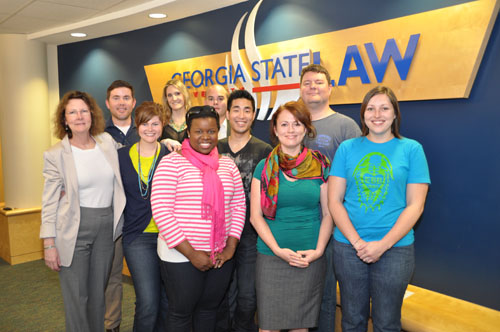Insuring Georgia's Children
As pupils in professor Sylvia Caley's Health Legislation and Advocacy class, third-year law student John Dinatale and second-year law student Joseph Leonard recently achieved something only a handful of students before them have accomplished: they drafted a piece of legislation and successfully shepherded it through the Georgia General Assembly and onto the Governor's desk.
Dinatale and Leonard's House Bill 1166 takes on the issue of standalone insurance policies for children and "draws a compromise between those advocating more options for insurers and the insurance industry's reluctance to gamble," Dinatale says. The bill found broad support at the gold dome in both chambers, across both parties.
Following passage of the Affordable Care Act in 2010, which currently prohibits denials of coverage for children with pre-existing conditions, insurers in Georgia stopped writing child-only policies. This left many Georgia children who are over-income for public programs such as Medicaid and PeachCare for Kids or have no access to group coverage uninsured. HB 1166 corrects this problem, requiring insurers to offer child-only insurance policies.
"The health legislation and advocacy class really walks that tightrope between a class and a clinic experience," Leonard says. While there is a significant research and discussion component, in the second half of the course the students are required to spend a lot of time on the ground at the Georgia State Capitol.
Caley designed the yearlong curriculum to focus on the development and implementation of health policy in Georgia through legislative and regulatory mechanisms as well as the roles lawyers and others play in the process. In the fall, the emphasis is on the theory and process of creating health policy; the spring term is more about the practical experience of tracking legislation through the session.
"Much of our health policy begins with the development and passage of legislation," Caley says. "The quality of the drafting, the creativity and activities of supporters or opponents of the legislation, and the compromises made to secure passage affect the utility and effectiveness of any statute."

At the start of the class, students are paired up and assigned a nonprofit community partner — in this case, Georgians for a Healthy Future — and an issue to work with. Over the course of the fall term they research and develop a legislative proposal on behalf of the community partner and support efforts to have the proposal introduced in the Georgia General Assembly. Caley, a registered nurse and director of the Health Law Partnership (HeLP), selects the issue each pair will focus on.
"Most of our issues evolve from our experience at the Health Law Partnership and the HeLP Legal Services Clinic representing individual clients experiencing legal problems," Caley says. "Patterns emerge that indicate that a legislative solution may be appropriate and available."
While every student pair works with their partner to draft a bill, not every proposal will be introduced as proposed legislation. Of the four issues researched this year, Dinatale and Leonard's was the only one to reach that point. Whether or not their own bill is under consideration, students in this class must monitor healthcare legislation as part of their coursework. They prepare hypothetical amendments and provide summaries for bills working their way through the session, write up talking points and other floor materials, and learn to decipher the intent and impact of a proposal from the language used.
HB 1166 marks the first legislative victory for Georgians for a Healthy Future, and the third bill from the Health Legislation and Advocacy course to make it through the session in the same year it was introduced. Other issues Caley's students have taken on have been successful in subsequent years.
"[This course] was an opportunity to peek behind the curtain to see how the sausage is made, I guess they say, and to really understand the vast array of interests are at work in the body politic," Dinatale says. "It was a fabulous experience."
Both Dinatale and Leonard hope to continue using their legal education to influence policy in their future careers. "Being able to research an issue and advocate for a solution is very empowering," Leonard says. "The process has been one that made me feel like I was helping people, and that I could make a difference."